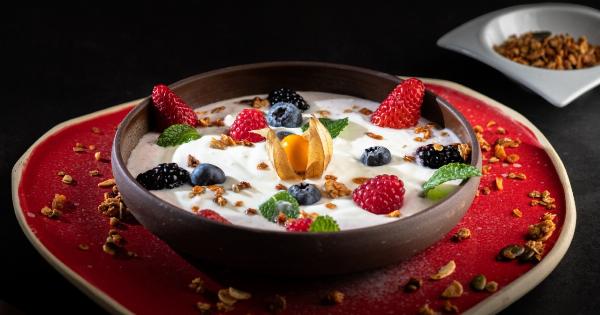Probiotics are gaining significant attention in the health and wellness world. These live bacteria and yeasts offer numerous health benefits, primarily by improving the gut flora balance.
While yogurt is the most commonly known probiotic food, there are plenty of other delicious options out there. Here are ten non-yogurt probiotic foods that you need to try:.
1. Kefir
Kefir is a fermented milk drink that originates from the Caucasus region. Similar to yogurt, kefir is loaded with beneficial bacteria and yeasts.
It has a tangy flavor and a creamy consistency, making it a versatile ingredient in smoothies, dressings, and baked goods. Kefir also contains high amounts of calcium, protein, and vitamins.
2. Sauerkraut
Sauerkraut is a traditional fermented cabbage dish that offers a wide range of probiotic benefits. Made through a process called lacto-fermentation, sauerkraut is an excellent source of beneficial bacteria.
It provides a delightful tangy taste and can be used as a condiment, added to salads, or used in various recipes for extra flavor and crunch.
3. Kimchi
Kimchi is a Korean side dish made of fermented vegetables, most commonly cabbage and radishes. This spicy and pungent dish boasts of health-promoting properties due to its probiotic content.
Kimchi is highly versatile and can be enjoyed on its own, added to stir-fries, or used as a topping for rice bowls.
4. Miso
Miso is a traditional Japanese seasoning produced by fermenting soybeans with salt and a fungus called koji. It has a savory flavor and is commonly used in soups, marinades, and dressings.
Apart from being a probiotic food, miso is also rich in essential nutrients such as manganese, copper, and vitamin K.
5. Tempeh
Tempeh is an Indonesian soy product made by fermenting soybeans with a fungus called Rhizopus oligosporus. It has a nutty and earthy flavor, making it a popular meat substitute for vegetarians and vegans.
Tempeh not only provides probiotics but is also an excellent source of protein, fiber, and various vitamins and minerals.
6. Kombucha
Kombucha is a fermented tea drink that has been consumed for centuries. It is made by fermenting sweetened tea with a scoby (symbiotic culture of bacteria and yeast).
Kombucha is known for its fizzy and tangy taste and is a great alternative to sugary sodas. It is also packed with probiotics, enzymes, and antioxidants.
7. Pickles
Pickles are cucumbers that have been fermented in brine or vinegar. Traditional pickles are made through the process of lacto-fermentation, making them a probiotic-rich food.
While store-bought pickles may not contain live cultures, homemade or artisanal varieties are your best bet for reaping probiotic benefits. Pickles can be enjoyed on their own as a snack or used to add a zesty flair to sandwiches and salads.
8. Coconut Kefir
For those who are lactose intolerant or prefer dairy-free options, coconut kefir is an excellent choice. Made from fermented coconut milk, it offers similar probiotic benefits as dairy-based kefir.
Coconut kefir has a slightly tangy and refreshing flavor, making it a great addition to smoothies or enjoyed on its own.
9. Natto
Natto is a traditional Japanese food made from fermented soybeans. It has a distinctive taste due to the Bacillus subtilis bacteria used in the fermentation process.
Natto is commonly served with rice and soy sauce and is a rich source of probiotics, protein, and vitamin K2.
10. Kvass
Kvass is a traditional Russian fermented beverage typically made from rye bread. However, it can also be made from beets, fruits, or vegetables. Kvass has a tangy and slightly sweet flavor and is often enjoyed as a refreshing summer drink.
It contains probiotics and a wide range of beneficial enzymes.































